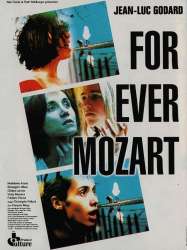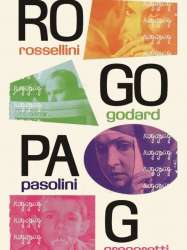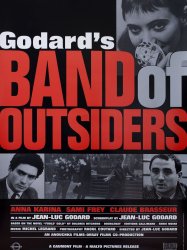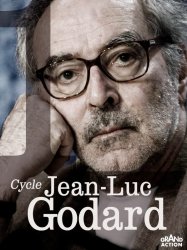Film Socialisme is a french film of genre Drama directed by Jean-Luc Godard released in france in DVD on 29 september 2010 with Christian Sinniger
Film Socialisme (2010)

If you like this film, let us know!
- Infos
- Casting
- Technical infos
- Photos
- Videos
- Film quotes
- Characters
- Music
- Awards
Release in DVD in france 29 september 2010
Length 1h41
Directed by Jean-Luc Godard
OriginFrance
Genres Drama
Rating56%










Film Socialisme alternative French title Socialisme, English: Socialism but often referred to as Film Socialism, is a 2010 French film directed by Jean-Luc Godard.
The film was first screened in the Un Certain Regard section at the 2010 Cannes Film Festival, to a widely varying reception, and released in France two days later, on 19 May 2010. It screened at the 48th New York Film Festival in 2010, the 27th film that Godard has shown at the festival.
Synopsis
According to the synopsis on the film's official website, the film is composed of three movements:Actors

Christian Sinniger
(Le père)

Olga Riazanova
(Agent secret russe)

Élisabeth Vitali
(La journaliste FR3 Regio)

Nadège Beausson-Diagne
(Constance)

Eye Haïdara
(La cameraman FR3 Regio)
Comments
Leave comment :
Suggestions of similar film to Film Socialisme
There are 20 films with the same actors, 76 films with the same director, 61737 with the same cinematographic genres, to have finally 70 suggestions of similar films.If you liked Film Socialisme, you will probably like those similar films :

Six in Paris (1965)
, 1h35Directed by Claude Chabrol, Jean Douchet, Éric Rohmer, Jean-Luc Godard, Jean Rouch, Jean-Daniel Pollet
Origin France
Genres Drama, Comedy
Themes Films about sexuality, Erotic films, Films about prostitution, Erotic thriller films
Actors Barbet Schroeder, Serge Davri, Gilles Quéant, Claude Melki, Jean-Michel Rouzière, Micheline Dax
Rating66%





Six réalisateurs emblématiques de la Nouvelle Vague revisitent Paris à leur manière, échafaudant des fictions au coeur des quartiers de la capitale. Tandis que Jean-Daniel Pollet vagabonde Rue Saint-Denis, Jean Rouch s'intéresse à la Gare du Nord, Jean Douchet à Saint-Germain des Prés et Eric Rohmer à Place de l'Etoile. Jean-Luc Godard hésite entre Montparnasse-Levallois, alors que Claude Chabrol préfère La Muette.

Nouvelle Vague (1990)
, 1h30Directed by Jean-Luc Godard
Origin France
Genres Drama, Fantasy
Actors Alain Delon, Domiziana Giordano, Laurence Côte, Odile Versois, Jacques Dacqmine, Roland Amstutz
Rating64%





La Contessa Elena Torlato-Favrini (her last name taken from The Barefoot Contessa) is a wealthy Italian industrialist living in a sprawling estate near Lake Geneva, Switzerland. She is attended by Jules the Gardener, his wife Yvonne, their daughter Cécile, the chauffeur Laurent, and the mysterious Della Larue (or "Della Street," a reference to Erle Stanley Gardner's Perry Mason stories). At the film's opening, Elena goes for a drive by herself and encounters Roger Lennox (his last name taken from The Long Goodbye), an apparent drifter. Elena's trajectory is brought to an abrupt halt as she stops to help Roger, who has evidently been forced off the road by a truck and is severely incapacitated. As Elena reaches out to take Roger's hand (the "miracle of empty hands"), their relationship begins.

For Ever Mozart (1996)
, 1h24Directed by Jean-Luc Godard
Origin France
Genres Drama, War, Comedy, Comedy-drama
Actors Frédéric Pierrot, Ghalya Lacroix, Vicky Messica, Harry Cleven, Michel Francini, Xavier Boulanger
Rating60%





The film is divided into four parts, which Godard has subsequently given by name. In the first part, "Theater," Vicky Vitalis, an elderly film director, is casting a new project called "Fatal Bolero," assisted by his nephew, Jérôme. A group of hopeful actors lines up to audition, but Vicky is dissatisfied with each of their line readings. The director nevertheless manages to secure funding from a man called Baron Felix, who himself secures one of the actresses named Sabine, to the chagrin of Sabine's plaintive boyfriend. Later, Jérôme accompanies Vicky's daughter, Camille, a professor of philosophy, as she searches for a copy of The Game of Love and Chance, the play by Pierre de Marivaux. Her intention is to stage the play in war torn Sarajevo. However, unable to find a copy, she settles instead on the Alfred de Musset play One Must Not Trifle with Love, happily noting that she shares the same name as the play's heroine. Jérôme, smitten with his cousin, decides to go to Sarajevo with her, to his mother Sylvie's dismay. Sylvie persuades her brother Vicky to accompany them, and the family's maid, Jamila, also decides to go. Camille and Jérôme decide to cast Jamila in the play as the character Rosette.

In Praise of Love (2001)
, 1h37Directed by Jean-Luc Godard
Genres Drama, Romance
Actors Bruno Putzulu, Cécile Camp, Jean Davy, Jérémie Lippmann, Remo Forlani, Juliette Binoche
Rating62%





The first half of the film, shot on black and white film, follows a man named Edgar who is working on an undefined "project" about what he considers the four stages of love: meeting, physical passion, separation, and reconciliation, involving people at three different stages of life: youth, adulthood, and old age. Edgar keeps flipping through the pages of an empty book, staring intently as if waiting for words to appear. He is unsure whether the project should be a novel, a play, an opera, or a film. In Paris, he interviews potential participants from all walks of life (including those people Victor Hugo dubbed les misérables, whom Edgar considers important to the project), but is continually dissatisfied. The person Edgar really wants is someone he met two years ago, a woman who "dared speak her mind." At the urging of his financial backer Mr. Rosenthal, an art dealer whose father once owned a gallery with Edgar's grandfather, Edgar tracks down the woman, named Berthe, where she is working at night cleaning passenger cars at a railroad depot. Berthe remembers Edgar (and marvels at his memory) but emphatically does not want to be involved in his project. She holds down several jobs and also cares for her three-year-old son. Edgar continues to interview people, to his continuing dissatisfaction. He is able to visualize the stages of youth and old age but keeps having trouble with adulthood.

King Lear (1987)
, 1h30Directed by Jean-Luc Godard
Origin France
Genres Drama, Comedy
Themes Théâtre, Political films, Films based on plays, Films based on works by William Shakespeare, Films about royalty
Actors Burgess Meredith, Molly Ringwald, Woody Allen, Leos Carax, Julie Delpy, Jean-Luc Godard
Rating54%





L'écrivain Norman Mailer doit écrire une nouvelle version du Roi Lear de William Shakespeare. L'histoire se déroule après la catastrophe survenue à Tchernobyl, la vie est revenue à la normale, mais l'art n'existe plus. William Shakespeare junior, cinquième du nom, se lance alors à la recherche d'oeuvres disparues. Il découvre un ponte de la mafia, Don Learo, et sa fille, Cordelia, qui entretiennent des rapports conflictuels.

Vivre Sa Vie (1962)
, 1h20Directed by Jean-Luc Godard
Origin France
Genres Drama
Themes Films about sexuality, Erotic films, Films about prostitution, Erotic thriller films
Actors Anna Karina, Sady Rebbot, André S. Labarthe, Gérard Hoffmann, Dimitri Dineff, Paul Pavel
Rating77%





Nana (Anna Karina), a beautiful Parisian in her early twenties, leaves her husband and infant son hoping to become an actress. Without money, beyond what she earns as a shopgirl, and unable to enter acting, she elects to earn better money as a prostitute. Soon she has a pimp, Raoul, who after an unspecified period agrees to sell Nana to another pimp. During the exchange the pimps argue and in a gun battle Nana is killed. Nana's short life on film is told in 12 brief episodes each preceded by a written resume. Godard introduces other idiosyncrasies to focus the viewer's attention.

Ro.Go.Pa.G. (1963)
, 1h51Directed by Jean-Luc Godard, Pier Paolo Pasolini, Roberto Rossellini, Ugo Gregoretti
Genres Drama, Comedy
Actors Rosanna Schiaffino, Gianrico Tedeschi, Orson Welles, Alexandra Stewart, Laura Betti, Jean-Marc Bory
Rating69%





Illibatezza ("Chastity") by Roberto Rossellini is a story of a beautiful stewardess which attracts unwanted attention from one of the air travelers - a middle aged American. The two overnight by chance in the same hotel. She has a fiancé back home, to whom she sends 8mm films made with her camera. These show how, in order to shoo away the unwanted flirtatious attentions of the traveler, all she had to do was to act in an aggressively provocative way; his sexual attraction being fueled by the shyness with which she initially tried to endure his advances.

Band of Outsiders (1964)
, 1h37Directed by Jean-Luc Godard, Pierre Delanjeac
Origin France
Genres Drama, Comedy, Crime, Romance
Themes Heist films, Gangster films, Escroquerie
Actors Anna Karina, Sami Frey, Claude Brasseur, Danièle Delorme, Jean-Luc Godard, Louisa Colpeyn
Rating75%





Odile (Anna Karina) meets a man named Franz (Sami Frey) in an English language class. She has told him of a large pile of money stashed in the villa where she lives with her aunt, Mme. Victoria and a man named M. Stoltz in Joinville, a Parisian suburb. Franz tells his friend Arthur (Claude Brasseur) of the money – and his nascent romance with Odile – and the two hatch a plan to steal it.
 , 1h51
, 1h51Directed by Claude Chabrol, Roman Polanski, Jean-Luc Godard, Ugo Gregoretti, Hiromichi Horikawa
Genres Drama, Comedy, Crime
Themes Escroquerie
Actors Catherine Deneuve, Charles Denner, Jean Seberg, Ken Mitsuda, Mie Hama, Yatsuko Tan'ami
Rating57%





Une jeune entraîneuse de bar s'entretient avec un homme relativement âgé qui fut jadis compositeur d'une chanson célèbre. L'homme se vante d'avoir payé une fortune son dentier en platine et se promène avec des liasses de billets dans son sac. La jeune fille lui propose de le raccompagner chez lui.

The Chinese (1967)
, 1h36Directed by Jean-Luc Godard
Origin France
Genres Drama, Comedy, Politic
Themes Politique, Political films
Actors Anne Wiazemsky, Jean-Pierre Léaud, Juliet Berto, Charles L. Bitsch, Raoul Coutard
Rating68%





La Chinoise is a loose adaptation of Fyodor Dostoyevsky's 1872 novel The Possessed. In the novel, a group of five disaffected citizens, each representing a different ideological persuasion and personality type, conspire to overthrow the Russian imperial regime through a campaign of sustained revolutionary violence. The film, set in contemporary Paris and largely taking place in a small apartment, is structured as a series of personal and ideological dialogues dramatizing the interactions of five French university students — three young men and two young women — belonging to a radical Maoist group called the "Aden Arabie Cell" (named for the novel, Aden, Arabie, by Paul Nizan).
 Connection
Connection